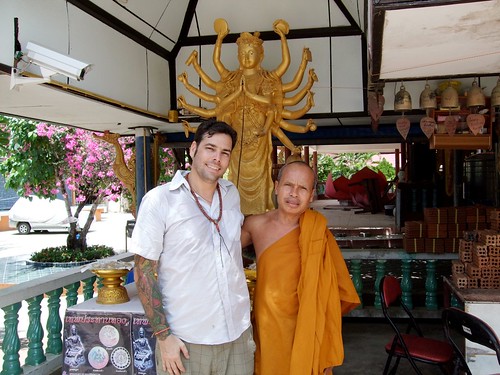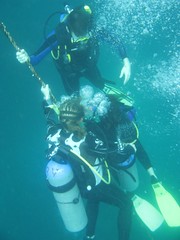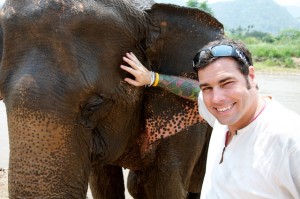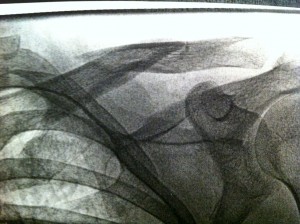 I fell in love with Thailand long ago before I first had the opportunity to visit this beautiful country. I remember the emotions that arose within me when we first heard about this exotic land in my grade 6 world history class. I came home that weekend (I attended a private boarding school) and when my mom asked me what I had learned, I stated that I would like to be a Buddhist and visit Thailand someday.
I fell in love with Thailand long ago before I first had the opportunity to visit this beautiful country. I remember the emotions that arose within me when we first heard about this exotic land in my grade 6 world history class. I came home that weekend (I attended a private boarding school) and when my mom asked me what I had learned, I stated that I would like to be a Buddhist and visit Thailand someday.
Some years later, I was selected to participate in Canada World Youth, a cultural exchange program between Canada and various host countries. My first choice was Thailand, but for some reason I ended up in the India program. Which to this day I credit with widening my travel interests, opening me to new beliefs and cultures.
Almost another decade passed before I made my way to Thailand for the first time. But ever since that initial visit, I have been fascinated by this country, its history, people, culture and religion.

Over the past 5 years, I’ve made several trips, exploring the Land of Smiles. I was blessed to visit Bangkok when the king celebrated his 60th anniversary as head of Thailand. I saw Thai people show their love for the royal family. It was in that moment as I walked the crowd, wearing my “Long Live the King†bracelet, making friends with youth and elderly locals that I realized how welcoming the Thai people really were, generating a profound desire to explore this culture in more depth.
Amazed by everything that this country had to offer, I wanted to stay here and immerse myself in this culture. Sadly I was stuck between my personal desires and my professional obligations, despite wanting to leave it all behind, I decided I would remain loyal to my goals and vocational needs.
In 2010, after suffering years of depression and a series of personal breakdowns, I opted to leave behind a career that had been at times amazing, while hard of my personal life and health. This welcome change set the foundation for me to return to my first love: Scuba diving and traveling the world.
Once again, I was free and open to explore the depth of Planet Ocean and immerse myself in other cultures. As I filtered my options, ranging from working in Belize, Honduras, Egypt, and Thailand I was torn having to choose between, culture, location and great mentors.
After consulting with several of my peers and life teachers, I opted to start my new path in Thailand. Fitting, considering that once again, I was embarking on a life changing path, ready to turn my world upside down.

I spent the better part of the last six months studying under one of the world’s most respected PADI Platinum Course Directors, Mark Soworka at Buddha View Dive Resort. While gaining the expertise needed to become a Master Scuba Diver Trainer, I helped him and the resort achieve some of their marketing goals utilizing my background and knowledge of the internet.
Working on Koh Tao over the past six months, has been a mixture of positive and challenging experiences. Sacrificing my desire for spiritual development to gain new skills and a deeper knowledge of the diving industry has been at times hard on me. Yet I knew that my stay on the Turtle Island was going to be relatively temporary and that ultimately it was a necessary step on my journey.
In February, I broke my collarbone, crashing my motorbike on my way home after work. This forced me once again to slow down, take a moment to reflect on my goals and life’s desires. It also allowed me to return to Canada for 6 weeks, spending time healing and visiting friends, family and loved ones.  (Read about my Broken Collar Bone)
During that time, I was offered a new job, managing and teaching scuba diving at a new upcoming dive shop in Tulamben, Bali. Torn by my desire to spend more time in Thailand and taking this amazing opportunity, I debated this once in a lifetime offer.
After receiving my clean bill of health, I returned to Asia in late March. Knowing that within a month I was moving to Bali, Indonesia and traveling with one of my best friend who had never visited Thailand, we set out on our journey around the old Kingdom of Siam.
First stop was to be Koh Tao where I had been working prior to my accident, sadly mother nature had other plans for us, and a nasty typhoon/tropical storm hit the Gulf and south of Thailand a few days before we arrived.
As we landed in Bangkok and received news of our peers stuck in some of the worst flooding to hit Koh Tao in years, we opted to travel around the country until things settled down south.
Our first destination was Katchanaburi, where just over half a century ago, allied troops where held in prison camps by the Japanese occupation troops. (This story was made famous by Director David Lean who filmed the movie, “The Bridge Over the River Kwai†in 1957).
Between the war monuments, visiting allied force cemeteries and exploring beautiful waterfalls at Erawan National Park, I realized how little I actually knew about Thailand. This sparked a new curiosity in me. Fueled by the fact that I was traveling with someone new to the Thai culture, we decided to travel around the countryside, learning about Thailand and its people.
From Bangkok to Phuket via Katchanaburi, Chumphon, Koh Tao, Koh Samui, and Chiang Mai there is still so much of this country that I have yet to see. So many stories I have yet to tell….



